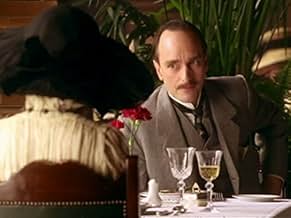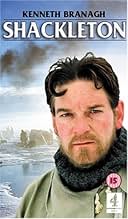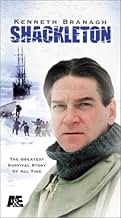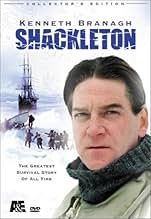Shackleton
- Mini serie TV
- 2002
- 1h 43min
Aggiungi una trama nella tua linguaThe true story of Shackleton's 1914 Endurance expedition to the South Pole, and his epic struggle to lead his twenty-eight man crew to safety after his ship was crushed in the pack ice.The true story of Shackleton's 1914 Endurance expedition to the South Pole, and his epic struggle to lead his twenty-eight man crew to safety after his ship was crushed in the pack ice.The true story of Shackleton's 1914 Endurance expedition to the South Pole, and his epic struggle to lead his twenty-eight man crew to safety after his ship was crushed in the pack ice.
- Vincitore di 2 Primetime Emmy
- 6 vittorie e 20 candidature totali
Recensioni in evidenza
Nice and breathtaking miniseries formed by two long episodes , shot in enough budget . It contains great production design, spectacular scenes and notorious as well as charming British actors. However , the film relies heavily on the complex relationships between Sir Ernest Henry Shackleton/Kenneth Branagh , his wife/Phoebe Nicholls and lover/ Embeth Davidtz . The movie gives engaging messages about fraternity, comradeship, compassion, forgiveness, love, courage and struggle for life . Including a lot of flashbacks and helping of the footage and still photos shot on the expedition. Shackelton is pretty well portrayed as the magnificent leader that he was, but is not presented as an infallible genius. He was a man who demonstrated extraordinary qualities in difficult circumstances, and he was a man who understood the burden of his leadership and the importance for getting his men home safely . Kenneth Branagh as Sir Ernest Henry Shackleton gives a very good acting . He is well accompanied by a fine plethora of Englsih players such as Corin Redgrave , Nicholas Rowe , Shaun Dooley , Kevin McNally , John Grillo , Mark Williams , Joseph Long , Mark Tandy , Robert Hardy , among others .This mini-series was written and directed by Charles Sturridge . He directed FairyTale: A True Story (1997) , A handful of dust , The scapegoat , Brideshead revisited (1981) ,Runners . And has directed various episodes , miniseries and Telefilms as Gulliver's Travels , Longitude ,The spoils of war , World in Action ,The Road to Coronation Street , Churchill's Secret , Cormoran strike , Crown Court , The Storyteller , Marcella , Sandition , Da Vinci's Demons , and several others
The miniseries finely based on historical facts , adding more remarks , these are the following ones : Sir Ernest Henry Shackleton (15 February 1874 - 5 January 1922) was a British polar explorer who led three British expeditions to the Antarctic. He was one of the principal figures of the period known as the Heroic Age of Antarctic Exploration. Born in Kilkea, County Kildare, Ireland, Shackleton and his Anglo-Irish family moved to Sydenham in suburban south London when he was ten. His first experience of the polar regions was as third officer on Captain Robert Falcon Scott's Discovery expedition of 1901-1904, from which he was sent home early on health grounds, after he and his companions Scott and Edward Adrian Wilson set a new southern record by marching to latitude 82°S. During the Nimrod expedition of 1907-1909, he and three companions established a new record Farthest South latitude at 88°S, only 97 geographical miles from the South Pole, the largest advance to the pole in exploration history. Also, members of his team climbed Mount Erebus, the most active Antarctic volcano. For these achievements, Shackleton was knighted by King Edward VII on his return home. After the race to the South Pole ended in December 1911, with Roald Amundsen's conquest, Shackleton turned his attention to the crossing of Antarctica from sea to sea, via the pole. To this end, he made preparations for what became the Imperial Trans-Antarctic Expedition, 1914-1917. Disaster struck this expedition when its ship, Endurance, became trapped in pack ice and was slowly crushed before the shore parties could be landed. The crew escaped by camping on the sea ice until it disintegrated, then by launching the lifeboats to reach Elephant Island and ultimately South Georgia Island, a stormy ocean voyage of 720 nautical miles and Shackleton's most famous exploit. In 1921, he returned to the Antarctic with the Shackleton-Rowett Expedition, but died of a heart attack while his ship was moored in South Georgia. At his wife's request, he was buried there. Away from his expeditions, Shackleton's life was generally restless and unfulfilled. In his search for rapid pathways to wealth and security, he launched business ventures which failed to prosper, and he died heavily in debt. Upon his death, he was lauded in the press but was thereafter largely forgotten, while the heroic reputation of his rival Scott was sustained for many decades. Later in the 20th century, Shackleton was "rediscovered¨, and rapidly became a role model for leadership as one who, in extreme circumstances, kept his team together in a survival story described by cultural historian Stephanie Barczewski as "incredible".
This drama was very polished in all respects, right down to the authenticity of the camera angle that the expedition's photographer Frank Hurley used when we was on the trip. Branagh is probably the best choice to play Shackleton and he supported by an able cast, who it has to be said, do not get to share very much of his limelight. But then this is a very remarkable story about a very remarkable leader of men and the sheer power of the courage displayed, together with the stunning visuals makes up for the lengthy first half, based mostly in Britain.
This is a powerful drama with a fine supporting cast. Overlong in places but for their patience, the viewer is rewarded with detailed authenticity and first class entertainment.
If this was a fictional story you watched in the cinema, you would leave thinking how unrealistic it was. You would know, after all, that keeping twenty-eight men alive in the wastelands of Antarctica, stranded and starving, is an impossible task, particularly set at the beginning of the twentieth century with the limited technology available. However, this is fact. This story did happen. And this is one of the most accurate films depicting the story of the "Endurance" expedition that you could hope for.
The story of Shackleton has passed on into legend. His attempt to cross the Antarctic continent on foot ended in disaster; his ship, the Endurance, crushed by the ice fields, leaving its crew on the ice sheet. Determined to survive, and displaying all the valour and courage he had demonstrated in his previous expedition (the "Nimrod", in which he turned back less than 100 miles from the pole in order to save the lives of his men), he began an incredible journey to the uninhabited Elephant Island, before having to contemplate a trip to South Georgia: a trip of 800 miles in a lifeboat...
This wonderful two-part adventure is accurate to almost every detail. A lot of research went into this film, consulting books, articles, experts, and even the diaries of the men themselves. And it doesn't make the mistake of solely confining itself to the story of Shackleton's heroism; indeed, the first two hours concentrates largely on the effort Sir Ernest put into forming the expedition, and the many obstacles that stood in his path - financially and emotionally.
Directed by award-winning Charles Sturridge, the casting is superb, particularly in the case of the protagonist, who - it must be said - looks a little like Shackleton himself. Well done, Celestia Fox! From Kenneth Branagh, a resourceful and irresistible Ernest Shackleton, down to to ex-Coronation Street's Ian Mercer as the simple Holdness, every character is brought into the 21st century with as much life as they had on the frozen shores of Elephant Island, thanks partly to a bombastic score of Adrian Johnston's invention.
There are only a couple of criticisms that one could make; for example, there continue to be references back to England, but there is no reunion at the end of the film between Shackleton and Emily, which could have been a way of saying "I'm back". I feel, however, that this continues to give "Shackleton" more character, as Sir Ernest only felt comfortable when exploring; never when at home with his family.
Another slight flaw is that there is next to no mention of the fate of the Aurora expedition, the crew assigned the task of aiding Shackleton to the other side of the continent (had the expedition gone to plan, of course!) However, this does not really relate to Shackleton himself, and indeed Sir Ernest seemed to forget about them until his men were brought over from Elephant Island.
Really, there is nothing major wrong with this film. It fully deserves 10 out of 10, and despite the DVD having no extras whatsoever, it is still worth the £15 for the pure entertainment you are given for the most enjoyable four hours of the small screen.
The first 100 minutes is concerned with the origins of the expedition, and Shackleton's efforts to raise support and prepare for it. The son of an Irish country doctor, he served in the Merchant Navy, but by 1914 he was a very experienced polar explorer, having been on two major earlier expeditions; he was in fact the Englishman who had been closest to the South Pole and survived. Although the first half drags at times, Kenneth Branagh's full-on performance as Shackleton gives us a clear picture of the sort of man he is, ambitious, hard-driving, single-minded, yet one who genuinely cares for the men under his command. He is even aware of the effect his exploration obsession is having on his family life (not to mention his relationship with his mistress), but he plows on regardless.
In the second half we are stuck on the polar pack ice, and the story turns into a conventional ripping yarn, but it is told with economy and a certain amount of humour. It is clear that, apart from luck, Shackleton and his men (the animals, alas, did not make it) owed their survival to Shackleton's good judgment and the fact that he was able to get all of them to rise to the occasion. He might have been slightly mad to get into such a fix to begin with, but he had no wish to suffer the fate of his colleague Captain Scott.
Branagh dominates the film of course, but his crew, mostly made up of little-known actors, come through as characters in their own right. Several stand out; Ken Drury as McNiesh, the feisty ship's carpenter, Kevin McNally as Worsley the lugubrious skipper, Celyn Jones as the Welsh stowaway Blackborow, and Nicholas Rowe as Colonel, the expedition odd-man-out. It is melancholy to recall, that several of the crew survived the Antarctic only to die in the trenches in France. Matt Day as the Australian photographer Frank Hurley, who produced some unforgettable images of the trip, also puts in a strong performance. The characters at home seem bloodless by comparison, with the exception of Phoebe Nicholl's determined Lady Shackleton. One wonders how Lord Curzon, that very superior person, who presided over the very tight-fisted Royal Geographical Society (nicely played by Corin Redgrave) would have got by on the expedition.
In 1922 Shackleton went back once more to the Antarctic but died of a heart attack at the whaling station on South Georgia before he was able to set off for the ice. He was only 48. Clearly, the attraction was more than fame and fortune he was in love with the place. Since then the whalers have gone and Antarctic is now the preserve of scientists and a small but growing number of tourists. Latter-day Shackletons have no great geographical questions to solve but still persist on doing things like trying to ski across the continent. I think I'll settle for the tourist ship myself, but it's vaguely comforting to know there are still such people around.
Lo sapevi?
- QuizThe scene in which Sir Ernest Henry Shackleton threatens to throw his gloves overboard if the crewman doesn't take them is based on a true incident. In actuality, it was Frank Hurley who wouldn't take them.
- BlooperWhen the men start hauling their boats over the ice, we see the name "J. Caird" clearly painted on one of them. A few minutes later Shackleton announces he has decided to name the boats and unveils the painted names for the first time.
- Citazioni
[Answering a question about his 1908-9 expedition]
Sir Ernest Shackleton: Thank you for your question. You are right, sir, we failed. We failed to reach the South Pole. I turned back. I chose life over death for myself and for my friends, which is why I am here to tell you about it tonight. But others follow in our footsteps Captain Scott, taking our route; the Norwegian, Amundsen, from the Bay of Whales. And if they should fail, then I will try again. Because I believe it is in our nature to explore, to reach out into the unknown. The only true failure... would be not to explore at all.
- ConnessioniFeatured in Shackleton: Breaking the Ice (2001)
I più visti
- How many seasons does Shackleton have?Powered by Alexa
Dettagli
- Data di uscita
- Paesi di origine
- Lingue
- Celebre anche come
- Shackleton: La odisea del Antártico
- Luoghi delle riprese
- Aziende produttrici
- Vedi altri crediti dell’azienda su IMDbPro
- Tempo di esecuzione1 ora 43 minuti
- Colore
- Mix di suoni
- Proporzioni
- 1.85 : 1
Contribuisci a questa pagina






































